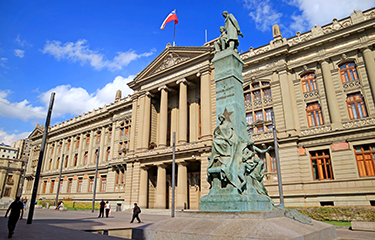Chile’s constitutional court (TC) has ruled that the presumption of environmental damage from farmed fish escapes is unconstitutional, setting a precedent for the country’s aquaculture sector.
In August 2020, Chile’s Superintendency of the Environment (SMA) levied a CLP 5.3 billion (USD 6.7 million, EUR 5.7 million) fine against Mowi for an incident involving a large-scale escape of over 690,000 fish from its Punta Redonda faming center on Guar Island in the south of the country in July 2018. In December of the same year, Chile’s Council for the Defense of the State (CDE) followed that up with a lawsuit filed with the third environmental court against Mowi Chile, seeking action by the salmon farmer to rectify the large-scale escape. At the time, CDE said that the event had caused “irreparable environmental damage,” as the farmer had failed to maintain “the appropriate security conditions and cultivation elements of optimal quality and resistance.”
SMA cited outdated water-current measurements at Mowi's Los Lagos region, Calbuco-district center built in 2017, failure to implement recommended moorings, and evidence of wear and tear of the nets and mooring lines. SMA alleged Mowi's failure to address these issues led to the escape when the center was subjected to extreme weather conditions. At the time, Mowi Chile stated the SMA resolution “is based exclusively on a legal presumption that has no scientific basis.”
Maintaining that the incident had caused no environmental damage, Mowi Chile appealed the fine to the TC in March 2021, requesting the inapplicability of article 118 of the General Law on Fisheries and Aquaculture. The TC has now declared unconstitutional the application of this regulation, which states that in the case of fish escapes, environmental damage is presumed if farmers are unable to recapture at least 10 percent of the escaped fish within 30 days of the incident.
“[A presumption of irreparable environmental damage] disrupts the full exercise of the right to due legal process, of which the accused is entitled, by incorporating a legal presumption that is not recognized and that alters the burden of proof without justification,” the TC said in its ruling.
The application of the rule “has left the accused in a weakened position, affecting [its] right to a fair and rational investigation, by imposing a virtual presumption of right with respect to the real significance of the damage actually caused by [its] actions,” the constitutional court added.
The TC ruling recognizes that “the rule suffers from certain constitutional flaws in its structure,” local law firm Albagli Zaliasnik, which counseled Mowi Chile in this case, told SalmonExpert. It referred to “the negative effects on due process by simply assuming – and without real possibilities of proving to the contrary – the occurrence of significant environmental damage.”
The ruling has been criticized by environmental groups, including Centro Ecocéanos, which advocates ending commercial salmon farming in the Patagonia.
"This corporate maneuvering reveals the salmon industry's attempt to convert the state of [Chile] into a submissive employee that endorses its destructive sanitary-environmental behavior, which generates a dangerous precedent whereby those regulated by the fishing and aquaculture system impose their own law,” the group said, according to El Mostrador.
In turn, Mowi Chile recognizes that the legal process will continue in the Third Environmental Court of Valdivia, where it will look to certify that it has strictly complied with the country's environmental regulations.
“The recent resolution of the TC confirms the position held by Mowi Chile since the beginning of the sanctioning procedure carried out by the SMA, in the sense that environmental damage must be proven and not presumed, also safeguarding the principles of equality before the law and due process,” the company said.
In its December 2020 38-page lawsuit, the CDE asserted the consequences of the introduction of thousands of non-native fish into the Reloncaví basin and estuary ecosystem “will produce considerable transformations in the biodiversity of the place, directly affecting native species.
"In effect, there is no way to recover the individuals of Atlantic salmon that have escaped, nor to reverse the effects of their escape, such as the consumption of native species and/or competition with them, or the alteration of habitats," it said.
Mowi, the world's largest salmon farmer, said it expects to expand its 2022 production in Chile, according to the guidance provided in its Q4 results. It is predicting flat production company-wide in 2022 at 460,000 metric tons (MT), but projects it will harvest 71,000 MT of salmon in Chile this year, up 7.8 percent from 2021 harvest total of 66,000 MT.
Photo courtesy of lovelypeace/Shutterstock







